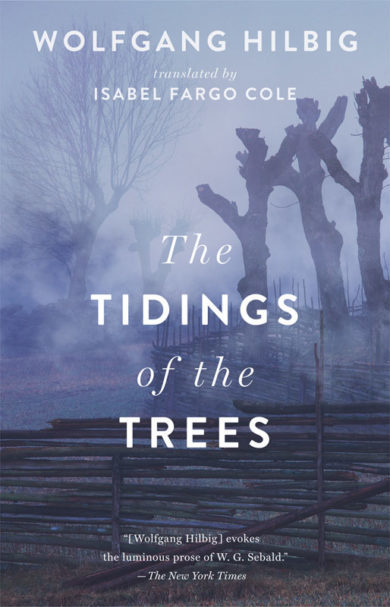What do you think?
Rate this book


112 pages, Paperback
First published January 1, 1992
And there was a speech in the trees that always ended in darkness…no, even in darkness it didn’t end, it merely spoke more softly than ever, and I recalled the nameless whisper of their leaves in the unseen. It was a language of return, permanently revolving around the existence of those leaves themselves, and thus around the permanence of Earth itself, and thus it spoke of the universe in which each leaf revolved with the Earth, and in the darkness the leaves went on rippling…like ash, and the swells of the ash went on into the darkness, and never ceased, even when the ash-red gloaming came, inaudibly soft, and the short day with its blue gloaming at dusk, when autumn sank its cool claws into the blue ash, or when the spring loosened the ash again, and on and on when the leaves and the ash required no more words, and the leaves of paper chafed together in the dust, and the dust chafed whisperingly at time that turned in space, on and on with that empty chafing in the dark that passed like years and had no age.
No, having glimpsed that figure in the branches of those visionary cherry trees, I didn’t want to lose sight of its fortunes again...if the word fortune isn’t too pretentious.--That figure's fate had begun perhaps twenty years prior, in a summer--no one knew now whether that summer had been hot or cold...in this country they’ve treated history so roughly that nothing is left of reality, not even the simplest things--a summer that would later be called the summer of the Wall. In fact, just a year later nothing could be recalled about that summer. less than nothing, for at once it had begun to fill up with atmospheric fiction.
No one, I said, could know more about the past, no one could be deeper in the know than the garbagemen. But no one asked them, for in the eyes of the world they were the ones with the least say. And if asked, they’d probably have seen themselves in the same way, perhaps they ultimately acquiesced in their somnambulistic doings on the terrain of ash...In actuality, they might think, it’s we, out here, who seal and perfect the process of forgetfulness the townspeople struggle with. Yet we ourselves can never forget... and that is the punchline of the story.
no... i saw no sign of that, there was contentment in their expressions; as always, they'd made their peace with misfortune even before it happened. on their brows i saw no move to escape.taken from the same collection as old rendering plant (die weiber, alte abdeckerei, die kunde von den baümen), wolfgang hilbig's the tidings of the trees is another bleak tale of "misfortune and stagnation." the late german writer was remarkably adept at creating dark, desolate milieus. waller, a man who has spent 20 years and all but failed in his attempt to put his (and his nation's collective) history down in writing, wanders and inhabits a cast-off field now used as a garbage dump. in this eerie, forsaken setting, waller encounters "the garbagemen" (enigmatic, apparition-like characters who have imposed upon themselves exile, while wading through and reclaiming the shards and leavings of nearby society) and recounts a past perhaps better soon forgotten. although there isn't much action in the novella, the tidings of the trees mulls the legacy, ramifications, and enduring trauma of consequential and devastating political history. through his tormented protagonist, hilbig, as he's done elsewhere, strives to make sense of the haunting aftereffects of his nation's dark history–and the lingering disquiet suffered by all those who managed to endure (and the ensuant dichotomy of memory and forgetting). hilbig's prose is poetic and evocative, if tinged by unforgettable imagery of desolation and existential emptiness.
no one, i said, could know more about the past, no one could be deeper in the know than the garbagemen. but no one asked them, for in the eyes of the world they were the ones with the least say. and if asked, they'd probably have seen themselves the same way; perhaps they ultimately acquiesced in their somnambulistic doings on the terrain of the ash... in actuality, they might think, it's we, out here, who seal and perfect the process of forgetfulness the townspeople struggle with. yet we ourselves can never forget... and that is the punchline of the story.